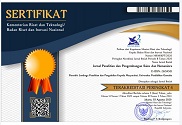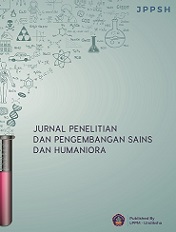Etos Kerja Wanita Pedagang Acung dan KebertahananNilai-Nilai Sosial-Ritual di Kalangan Masyarakat Bali
DOI:
https://doi.org/10.23887/jppsh.v1i1.12923Keywords:
ethos work, free-merchant woman, socio-culture valueAbstract
Target of this research is to identify and formulate of free-merchantwoman work ethos at central of tourism area in Bali and to know relation
among ethos work of free-merchant woman with socio-culture conflict. This
Research used approach "Critical Etnography Research" in research paradigm
qualitative. Research data collected by using partisipative observation,
interview, quitionaire, and document studies. Overall of research data a nalysed
by using technique analyse qualitative with analysis model pass by dots-quickly.
Result of research indicate that: (1) all of free-merchant woman in Bali have
typical of activity ethos and have the open character, (2) there are bearing
having the character of magic-logical among ethos work of all free-merchant
woman in Bali with friction of local socio-culrure, (3) patterned thinking and
behavior of all free-merchants woman give very positive contribution to
construction effort and added values for existention of Balines society.
Downloads
Published
2018-01-05
Issue
Section
Articles
License
Authors who publish with the Jurnal Penelitian dan Pengembangan Sains dan Humaniora agree to the following terms:
- Authors retain copyright and grant the journal the right of first publication with the work simultaneously licensed under a Creative Commons Attribution License (CC BY-SA 4.0) that allows others to share the work with an acknowledgment of the work's authorship and initial publication in this journal.
- Authors are able to enter into separate, additional contractual arrangements for the non-exclusive distribution of the journal's published version of the work (e.g., post it to an institutional repository or publish it in a book), with an acknowledgment of its initial publication in this journal.
- Authors are permitted and encouraged to post their work online (e.g., in institutional repositories or on their website) prior to and during the submission process, as it can lead to productive exchanges, as well as earlier and greater citation of published work. (See The Effect of Open Access)










